Literature Review: Writers' Retreats Impact on Academic Writing
VerifiedAdded on 2021/04/21
|8
|1520
|80
Literature Review
AI Summary
This literature review examines the impact of writers' retreats on academic writing, focusing on the article by Moore (2010). The review explores how writers' retreats can increase motivation and improve scholarly writing by offering structured interventions and promoting productive writing patterns. It highlights the importance of environment, accepting feedback, and overcoming writing challenges. The review also identifies a gap in the literature regarding how writers can overcome specific barriers and gain confidence during the writing process. The study emphasizes that retreats encourage writers to incorporate innovative ideas and experimental topics, ultimately enhancing their writing skills and career prospects. The review concludes that writers' retreats are valuable for professional development and contribute to more effective academic writing, and provide a detailed analysis of the benefits of writers' retreats for academics, focusing on the role of motivation, structured writing sessions, and the acceptance of feedback, while also pointing out gaps in current research.
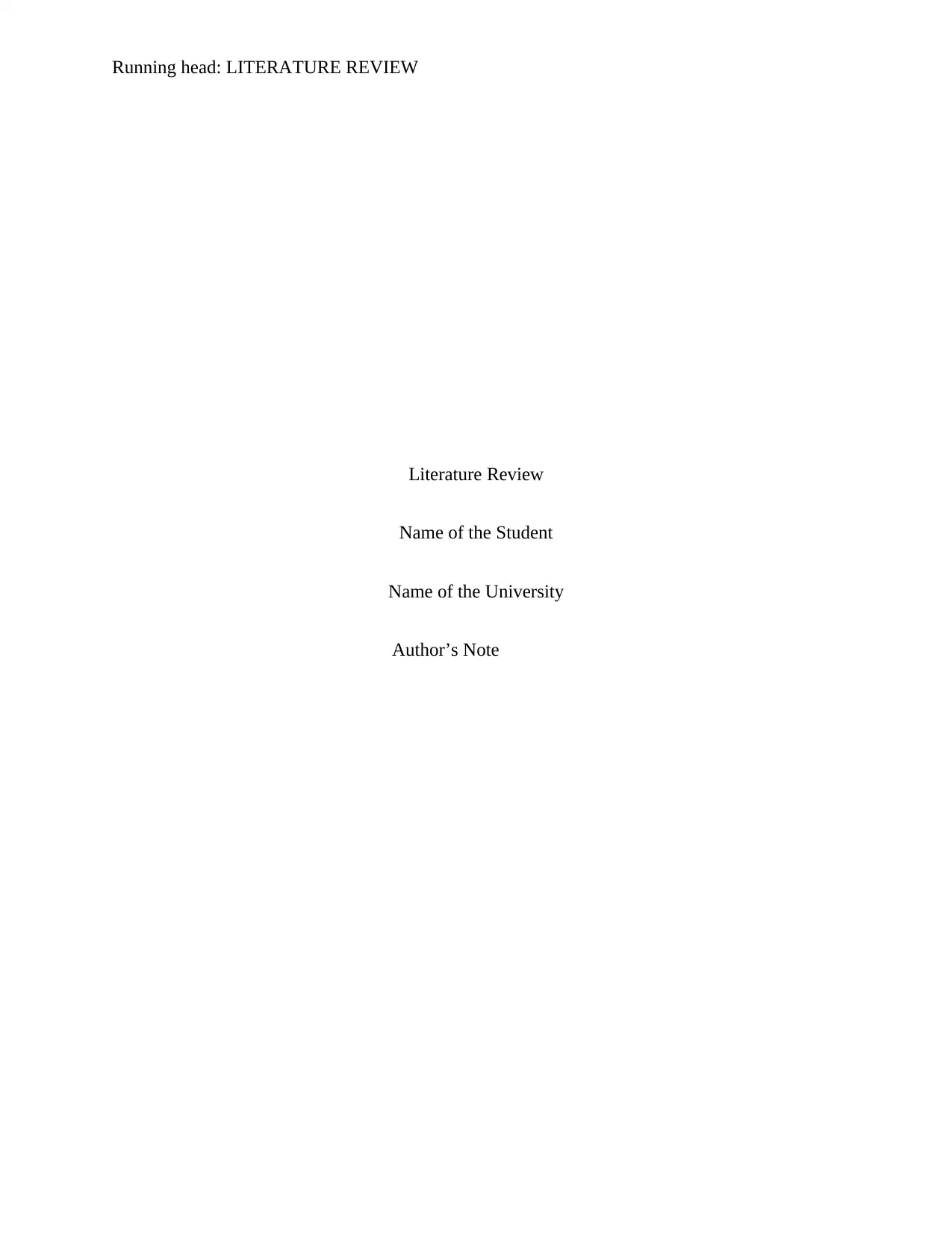
Running head: LITERATURE REVIEW
Literature Review
Name of the Student
Name of the University
Author’s Note
Literature Review
Name of the Student
Name of the University
Author’s Note
Paraphrase This Document
Need a fresh take? Get an instant paraphrase of this document with our AI Paraphraser
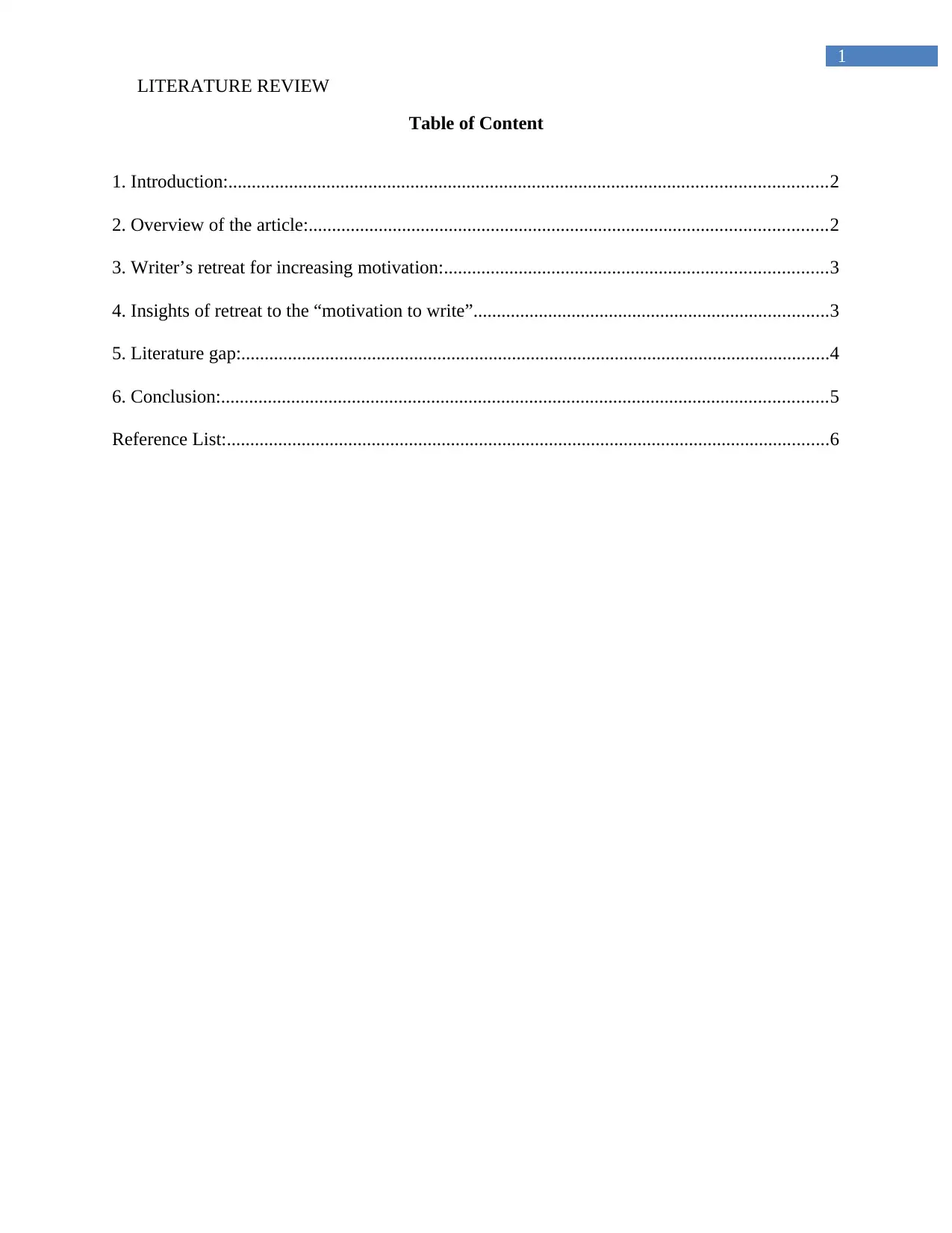
1
LITERATURE REVIEW
Table of Content
1. Introduction:................................................................................................................................2
2. Overview of the article:...............................................................................................................2
3. Writer’s retreat for increasing motivation:..................................................................................3
4. Insights of retreat to the “motivation to write”............................................................................3
5. Literature gap:..............................................................................................................................4
6. Conclusion:..................................................................................................................................5
Reference List:.................................................................................................................................6
LITERATURE REVIEW
Table of Content
1. Introduction:................................................................................................................................2
2. Overview of the article:...............................................................................................................2
3. Writer’s retreat for increasing motivation:..................................................................................3
4. Insights of retreat to the “motivation to write”............................................................................3
5. Literature gap:..............................................................................................................................4
6. Conclusion:..................................................................................................................................5
Reference List:.................................................................................................................................6
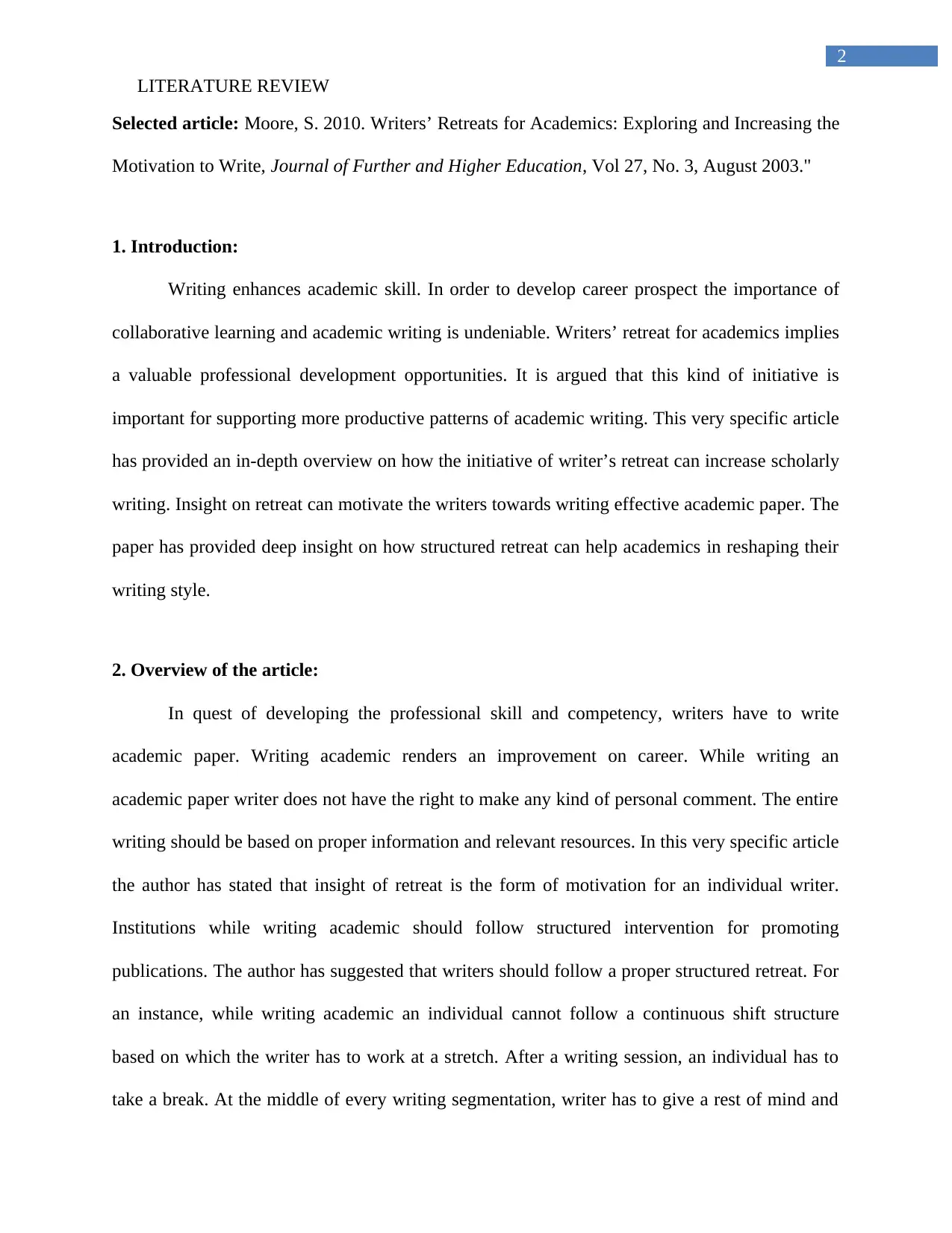
2
LITERATURE REVIEW
Selected article: Moore, S. 2010. Writers’ Retreats for Academics: Exploring and Increasing the
Motivation to Write, Journal of Further and Higher Education, Vol 27, No. 3, August 2003."
1. Introduction:
Writing enhances academic skill. In order to develop career prospect the importance of
collaborative learning and academic writing is undeniable. Writers’ retreat for academics implies
a valuable professional development opportunities. It is argued that this kind of initiative is
important for supporting more productive patterns of academic writing. This very specific article
has provided an in-depth overview on how the initiative of writer’s retreat can increase scholarly
writing. Insight on retreat can motivate the writers towards writing effective academic paper. The
paper has provided deep insight on how structured retreat can help academics in reshaping their
writing style.
2. Overview of the article:
In quest of developing the professional skill and competency, writers have to write
academic paper. Writing academic renders an improvement on career. While writing an
academic paper writer does not have the right to make any kind of personal comment. The entire
writing should be based on proper information and relevant resources. In this very specific article
the author has stated that insight of retreat is the form of motivation for an individual writer.
Institutions while writing academic should follow structured intervention for promoting
publications. The author has suggested that writers should follow a proper structured retreat. For
an instance, while writing academic an individual cannot follow a continuous shift structure
based on which the writer has to work at a stretch. After a writing session, an individual has to
take a break. At the middle of every writing segmentation, writer has to give a rest of mind and
LITERATURE REVIEW
Selected article: Moore, S. 2010. Writers’ Retreats for Academics: Exploring and Increasing the
Motivation to Write, Journal of Further and Higher Education, Vol 27, No. 3, August 2003."
1. Introduction:
Writing enhances academic skill. In order to develop career prospect the importance of
collaborative learning and academic writing is undeniable. Writers’ retreat for academics implies
a valuable professional development opportunities. It is argued that this kind of initiative is
important for supporting more productive patterns of academic writing. This very specific article
has provided an in-depth overview on how the initiative of writer’s retreat can increase scholarly
writing. Insight on retreat can motivate the writers towards writing effective academic paper. The
paper has provided deep insight on how structured retreat can help academics in reshaping their
writing style.
2. Overview of the article:
In quest of developing the professional skill and competency, writers have to write
academic paper. Writing academic renders an improvement on career. While writing an
academic paper writer does not have the right to make any kind of personal comment. The entire
writing should be based on proper information and relevant resources. In this very specific article
the author has stated that insight of retreat is the form of motivation for an individual writer.
Institutions while writing academic should follow structured intervention for promoting
publications. The author has suggested that writers should follow a proper structured retreat. For
an instance, while writing academic an individual cannot follow a continuous shift structure
based on which the writer has to work at a stretch. After a writing session, an individual has to
take a break. At the middle of every writing segmentation, writer has to give a rest of mind and
⊘ This is a preview!⊘
Do you want full access?
Subscribe today to unlock all pages.

Trusted by 1+ million students worldwide
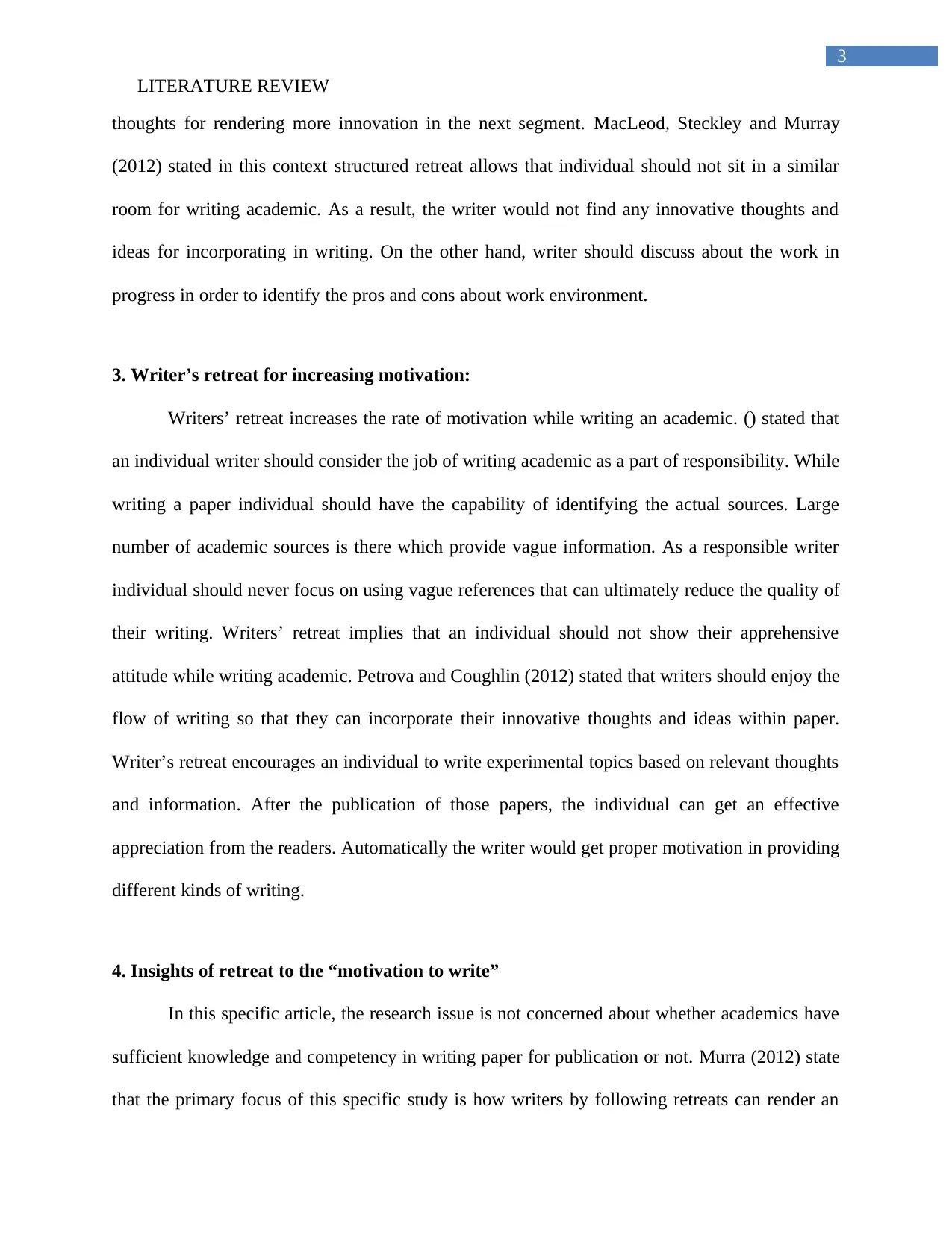
3
LITERATURE REVIEW
thoughts for rendering more innovation in the next segment. MacLeod, Steckley and Murray
(2012) stated in this context structured retreat allows that individual should not sit in a similar
room for writing academic. As a result, the writer would not find any innovative thoughts and
ideas for incorporating in writing. On the other hand, writer should discuss about the work in
progress in order to identify the pros and cons about work environment.
3. Writer’s retreat for increasing motivation:
Writers’ retreat increases the rate of motivation while writing an academic. () stated that
an individual writer should consider the job of writing academic as a part of responsibility. While
writing a paper individual should have the capability of identifying the actual sources. Large
number of academic sources is there which provide vague information. As a responsible writer
individual should never focus on using vague references that can ultimately reduce the quality of
their writing. Writers’ retreat implies that an individual should not show their apprehensive
attitude while writing academic. Petrova and Coughlin (2012) stated that writers should enjoy the
flow of writing so that they can incorporate their innovative thoughts and ideas within paper.
Writer’s retreat encourages an individual to write experimental topics based on relevant thoughts
and information. After the publication of those papers, the individual can get an effective
appreciation from the readers. Automatically the writer would get proper motivation in providing
different kinds of writing.
4. Insights of retreat to the “motivation to write”
In this specific article, the research issue is not concerned about whether academics have
sufficient knowledge and competency in writing paper for publication or not. Murra (2012) state
that the primary focus of this specific study is how writers by following retreats can render an
LITERATURE REVIEW
thoughts for rendering more innovation in the next segment. MacLeod, Steckley and Murray
(2012) stated in this context structured retreat allows that individual should not sit in a similar
room for writing academic. As a result, the writer would not find any innovative thoughts and
ideas for incorporating in writing. On the other hand, writer should discuss about the work in
progress in order to identify the pros and cons about work environment.
3. Writer’s retreat for increasing motivation:
Writers’ retreat increases the rate of motivation while writing an academic. () stated that
an individual writer should consider the job of writing academic as a part of responsibility. While
writing a paper individual should have the capability of identifying the actual sources. Large
number of academic sources is there which provide vague information. As a responsible writer
individual should never focus on using vague references that can ultimately reduce the quality of
their writing. Writers’ retreat implies that an individual should not show their apprehensive
attitude while writing academic. Petrova and Coughlin (2012) stated that writers should enjoy the
flow of writing so that they can incorporate their innovative thoughts and ideas within paper.
Writer’s retreat encourages an individual to write experimental topics based on relevant thoughts
and information. After the publication of those papers, the individual can get an effective
appreciation from the readers. Automatically the writer would get proper motivation in providing
different kinds of writing.
4. Insights of retreat to the “motivation to write”
In this specific article, the research issue is not concerned about whether academics have
sufficient knowledge and competency in writing paper for publication or not. Murra (2012) state
that the primary focus of this specific study is how writers by following retreats can render an
Paraphrase This Document
Need a fresh take? Get an instant paraphrase of this document with our AI Paraphraser
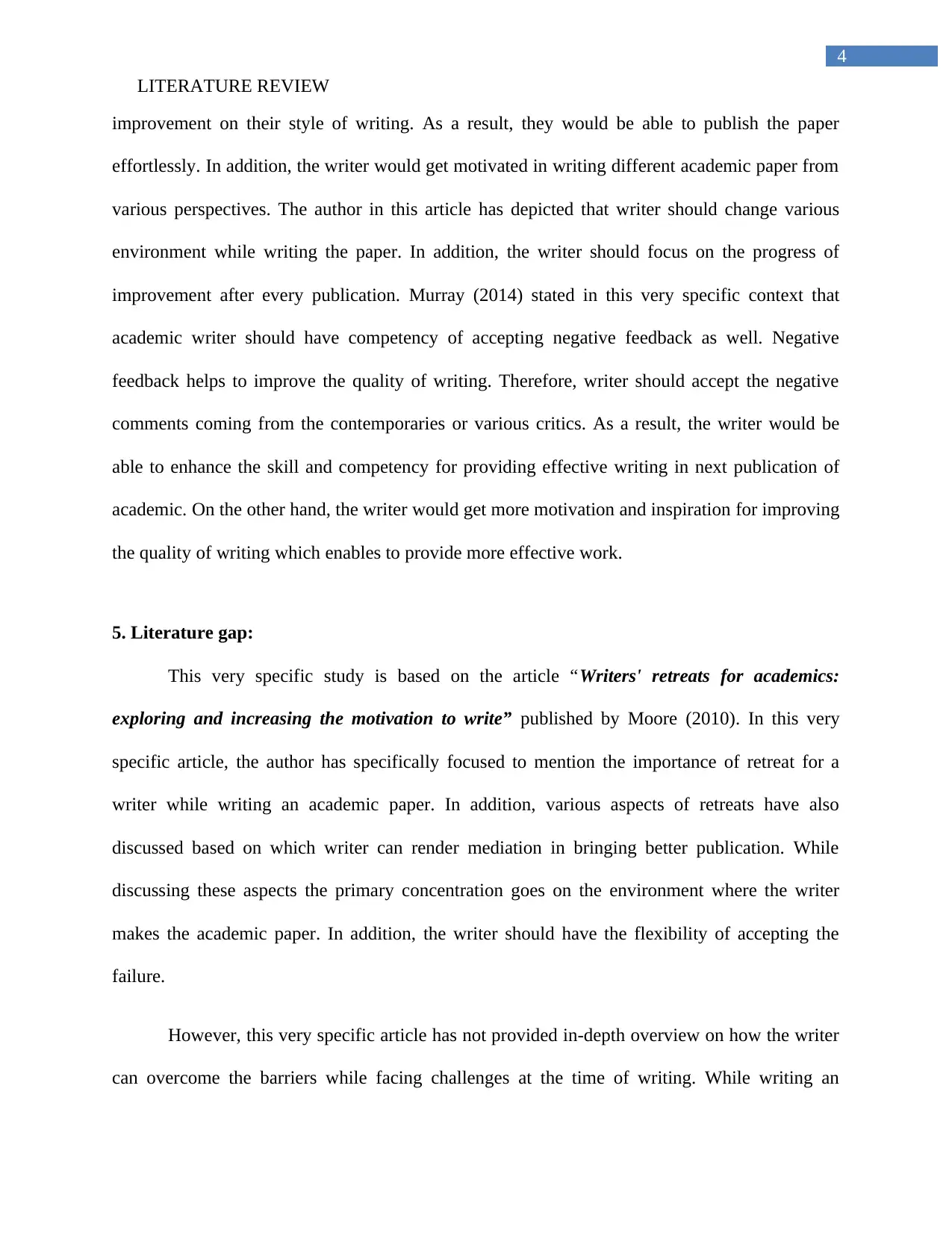
4
LITERATURE REVIEW
improvement on their style of writing. As a result, they would be able to publish the paper
effortlessly. In addition, the writer would get motivated in writing different academic paper from
various perspectives. The author in this article has depicted that writer should change various
environment while writing the paper. In addition, the writer should focus on the progress of
improvement after every publication. Murray (2014) stated in this very specific context that
academic writer should have competency of accepting negative feedback as well. Negative
feedback helps to improve the quality of writing. Therefore, writer should accept the negative
comments coming from the contemporaries or various critics. As a result, the writer would be
able to enhance the skill and competency for providing effective writing in next publication of
academic. On the other hand, the writer would get more motivation and inspiration for improving
the quality of writing which enables to provide more effective work.
5. Literature gap:
This very specific study is based on the article “Writers' retreats for academics:
exploring and increasing the motivation to write” published by Moore (2010). In this very
specific article, the author has specifically focused to mention the importance of retreat for a
writer while writing an academic paper. In addition, various aspects of retreats have also
discussed based on which writer can render mediation in bringing better publication. While
discussing these aspects the primary concentration goes on the environment where the writer
makes the academic paper. In addition, the writer should have the flexibility of accepting the
failure.
However, this very specific article has not provided in-depth overview on how the writer
can overcome the barriers while facing challenges at the time of writing. While writing an
LITERATURE REVIEW
improvement on their style of writing. As a result, they would be able to publish the paper
effortlessly. In addition, the writer would get motivated in writing different academic paper from
various perspectives. The author in this article has depicted that writer should change various
environment while writing the paper. In addition, the writer should focus on the progress of
improvement after every publication. Murray (2014) stated in this very specific context that
academic writer should have competency of accepting negative feedback as well. Negative
feedback helps to improve the quality of writing. Therefore, writer should accept the negative
comments coming from the contemporaries or various critics. As a result, the writer would be
able to enhance the skill and competency for providing effective writing in next publication of
academic. On the other hand, the writer would get more motivation and inspiration for improving
the quality of writing which enables to provide more effective work.
5. Literature gap:
This very specific study is based on the article “Writers' retreats for academics:
exploring and increasing the motivation to write” published by Moore (2010). In this very
specific article, the author has specifically focused to mention the importance of retreat for a
writer while writing an academic paper. In addition, various aspects of retreats have also
discussed based on which writer can render mediation in bringing better publication. While
discussing these aspects the primary concentration goes on the environment where the writer
makes the academic paper. In addition, the writer should have the flexibility of accepting the
failure.
However, this very specific article has not provided in-depth overview on how the writer
can overcome the barriers while facing challenges at the time of writing. While writing an
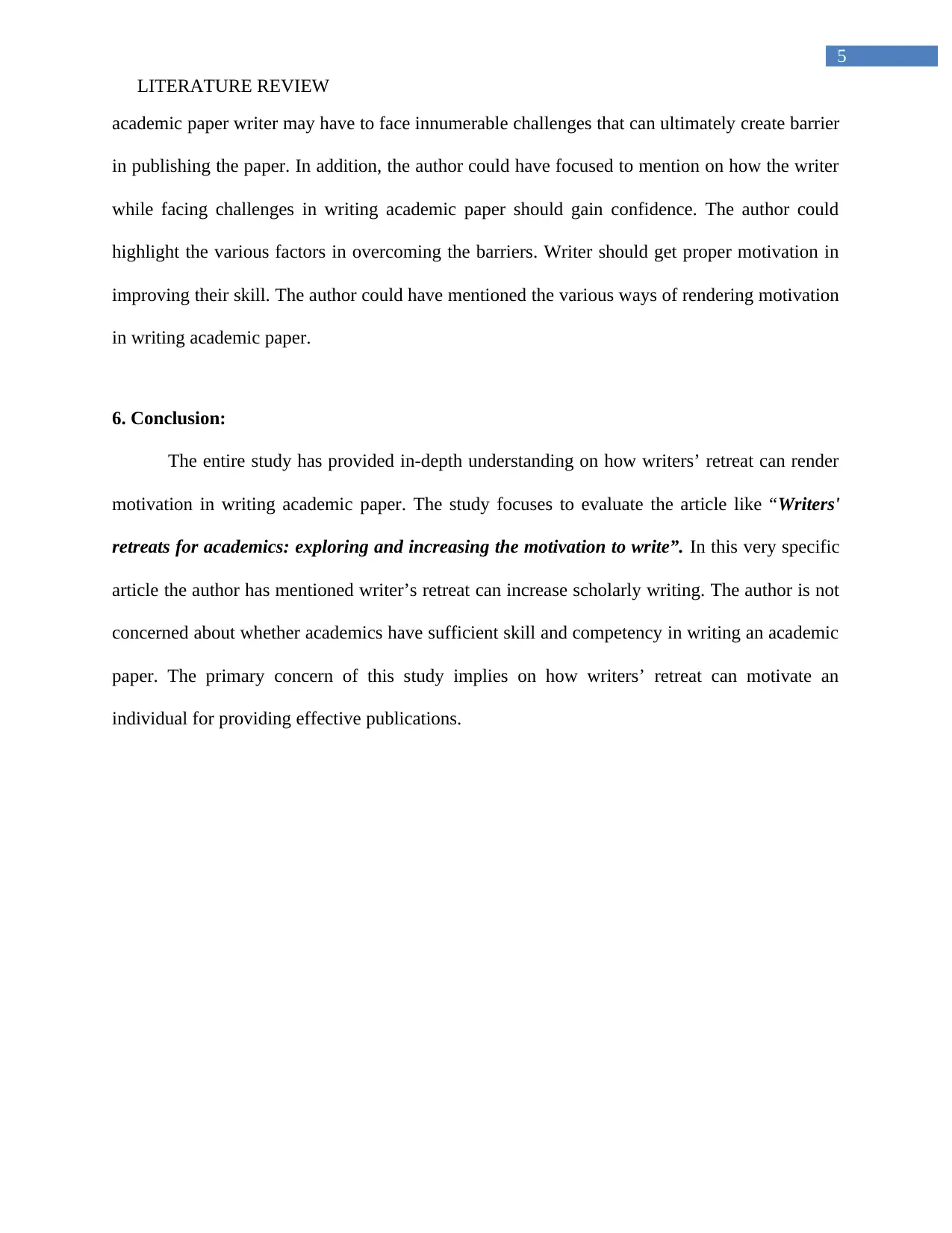
5
LITERATURE REVIEW
academic paper writer may have to face innumerable challenges that can ultimately create barrier
in publishing the paper. In addition, the author could have focused to mention on how the writer
while facing challenges in writing academic paper should gain confidence. The author could
highlight the various factors in overcoming the barriers. Writer should get proper motivation in
improving their skill. The author could have mentioned the various ways of rendering motivation
in writing academic paper.
6. Conclusion:
The entire study has provided in-depth understanding on how writers’ retreat can render
motivation in writing academic paper. The study focuses to evaluate the article like “Writers'
retreats for academics: exploring and increasing the motivation to write”. In this very specific
article the author has mentioned writer’s retreat can increase scholarly writing. The author is not
concerned about whether academics have sufficient skill and competency in writing an academic
paper. The primary concern of this study implies on how writers’ retreat can motivate an
individual for providing effective publications.
LITERATURE REVIEW
academic paper writer may have to face innumerable challenges that can ultimately create barrier
in publishing the paper. In addition, the author could have focused to mention on how the writer
while facing challenges in writing academic paper should gain confidence. The author could
highlight the various factors in overcoming the barriers. Writer should get proper motivation in
improving their skill. The author could have mentioned the various ways of rendering motivation
in writing academic paper.
6. Conclusion:
The entire study has provided in-depth understanding on how writers’ retreat can render
motivation in writing academic paper. The study focuses to evaluate the article like “Writers'
retreats for academics: exploring and increasing the motivation to write”. In this very specific
article the author has mentioned writer’s retreat can increase scholarly writing. The author is not
concerned about whether academics have sufficient skill and competency in writing an academic
paper. The primary concern of this study implies on how writers’ retreat can motivate an
individual for providing effective publications.
⊘ This is a preview!⊘
Do you want full access?
Subscribe today to unlock all pages.

Trusted by 1+ million students worldwide
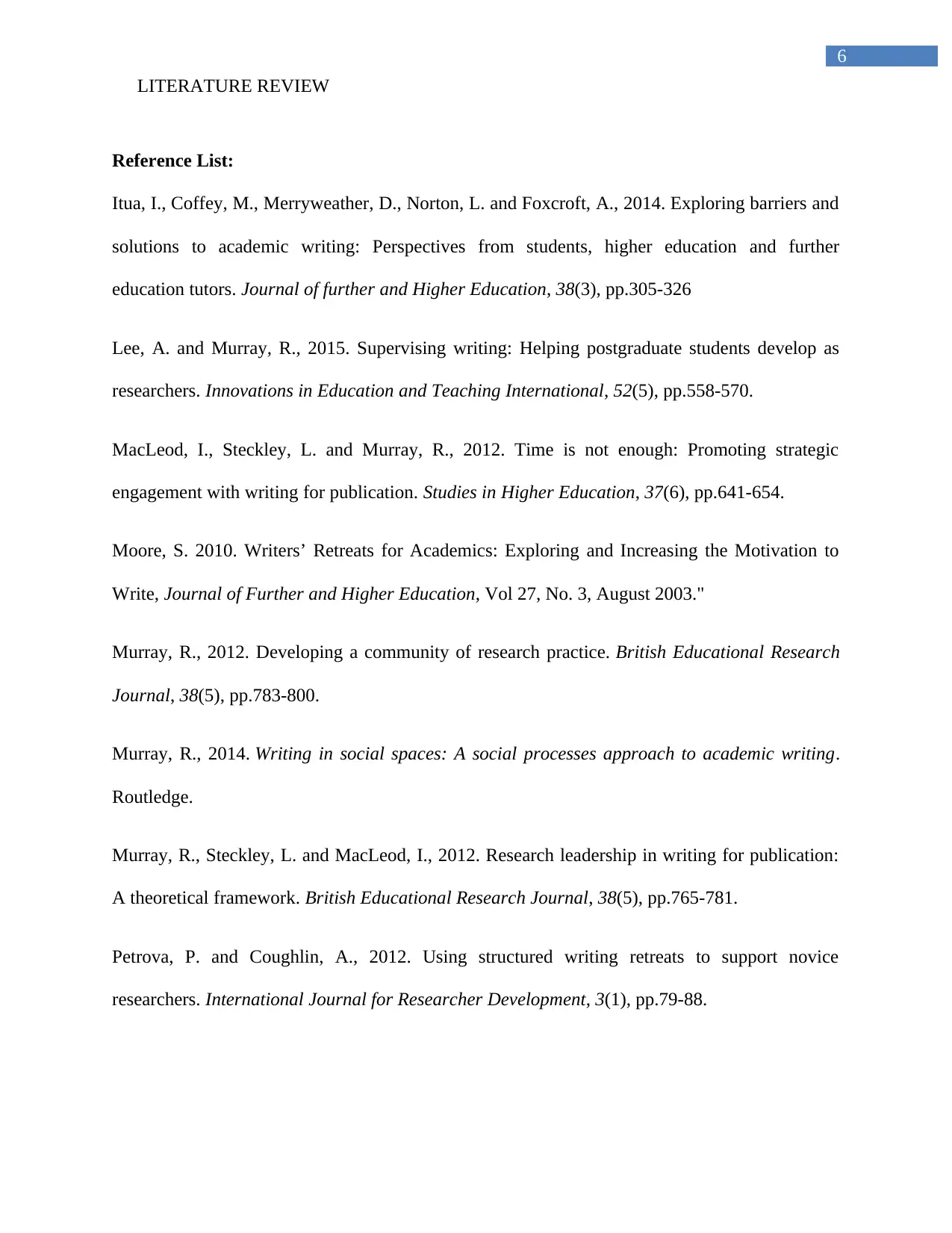
6
LITERATURE REVIEW
Reference List:
Itua, I., Coffey, M., Merryweather, D., Norton, L. and Foxcroft, A., 2014. Exploring barriers and
solutions to academic writing: Perspectives from students, higher education and further
education tutors. Journal of further and Higher Education, 38(3), pp.305-326
Lee, A. and Murray, R., 2015. Supervising writing: Helping postgraduate students develop as
researchers. Innovations in Education and Teaching International, 52(5), pp.558-570.
MacLeod, I., Steckley, L. and Murray, R., 2012. Time is not enough: Promoting strategic
engagement with writing for publication. Studies in Higher Education, 37(6), pp.641-654.
Moore, S. 2010. Writers’ Retreats for Academics: Exploring and Increasing the Motivation to
Write, Journal of Further and Higher Education, Vol 27, No. 3, August 2003."
Murray, R., 2012. Developing a community of research practice. British Educational Research
Journal, 38(5), pp.783-800.
Murray, R., 2014. Writing in social spaces: A social processes approach to academic writing.
Routledge.
Murray, R., Steckley, L. and MacLeod, I., 2012. Research leadership in writing for publication:
A theoretical framework. British Educational Research Journal, 38(5), pp.765-781.
Petrova, P. and Coughlin, A., 2012. Using structured writing retreats to support novice
researchers. International Journal for Researcher Development, 3(1), pp.79-88.
LITERATURE REVIEW
Reference List:
Itua, I., Coffey, M., Merryweather, D., Norton, L. and Foxcroft, A., 2014. Exploring barriers and
solutions to academic writing: Perspectives from students, higher education and further
education tutors. Journal of further and Higher Education, 38(3), pp.305-326
Lee, A. and Murray, R., 2015. Supervising writing: Helping postgraduate students develop as
researchers. Innovations in Education and Teaching International, 52(5), pp.558-570.
MacLeod, I., Steckley, L. and Murray, R., 2012. Time is not enough: Promoting strategic
engagement with writing for publication. Studies in Higher Education, 37(6), pp.641-654.
Moore, S. 2010. Writers’ Retreats for Academics: Exploring and Increasing the Motivation to
Write, Journal of Further and Higher Education, Vol 27, No. 3, August 2003."
Murray, R., 2012. Developing a community of research practice. British Educational Research
Journal, 38(5), pp.783-800.
Murray, R., 2014. Writing in social spaces: A social processes approach to academic writing.
Routledge.
Murray, R., Steckley, L. and MacLeod, I., 2012. Research leadership in writing for publication:
A theoretical framework. British Educational Research Journal, 38(5), pp.765-781.
Petrova, P. and Coughlin, A., 2012. Using structured writing retreats to support novice
researchers. International Journal for Researcher Development, 3(1), pp.79-88.
Paraphrase This Document
Need a fresh take? Get an instant paraphrase of this document with our AI Paraphraser
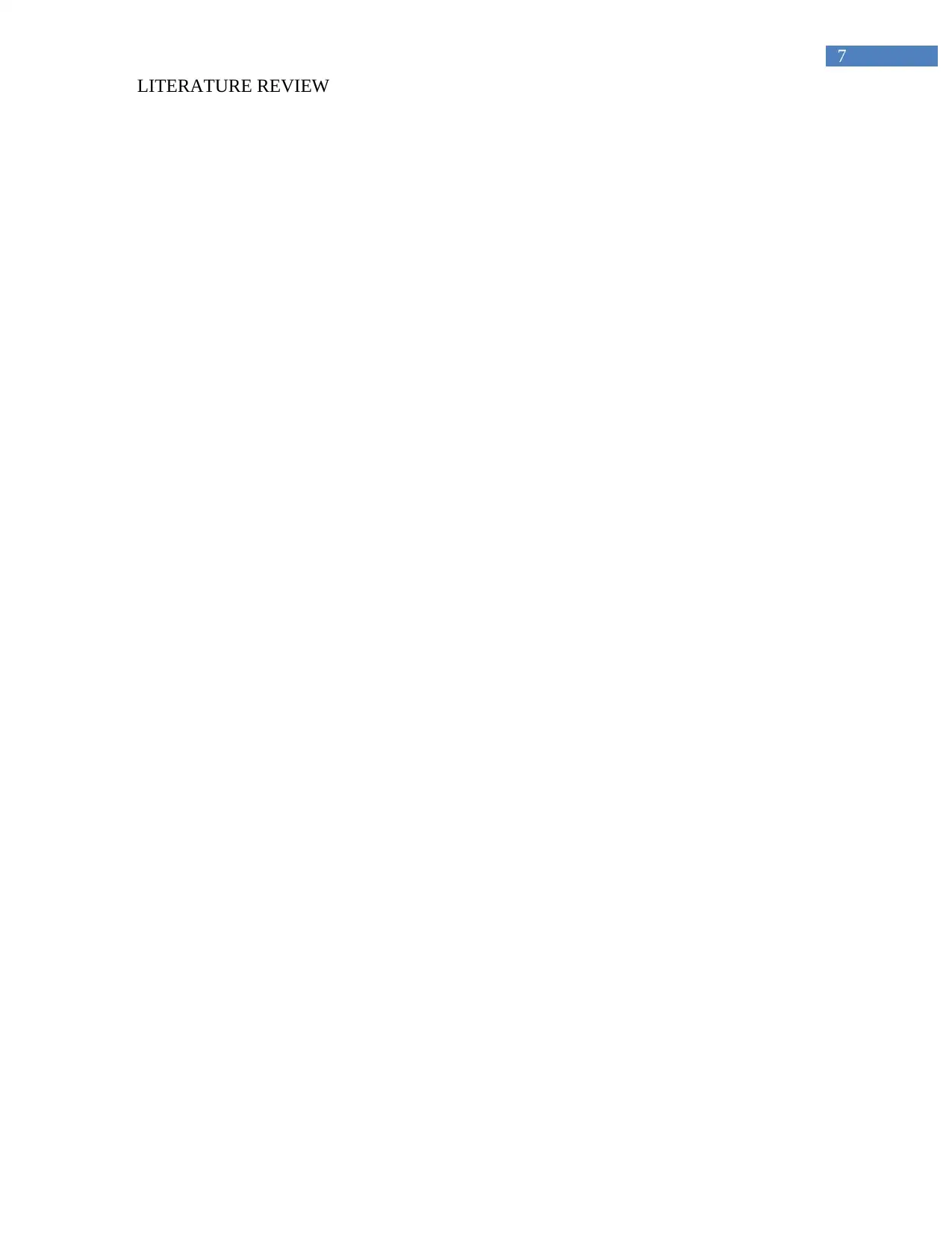
7
LITERATURE REVIEW
LITERATURE REVIEW
1 out of 8
Related Documents
Your All-in-One AI-Powered Toolkit for Academic Success.
+13062052269
info@desklib.com
Available 24*7 on WhatsApp / Email
![[object Object]](/_next/static/media/star-bottom.7253800d.svg)
Unlock your academic potential
Copyright © 2020–2025 A2Z Services. All Rights Reserved. Developed and managed by ZUCOL.




